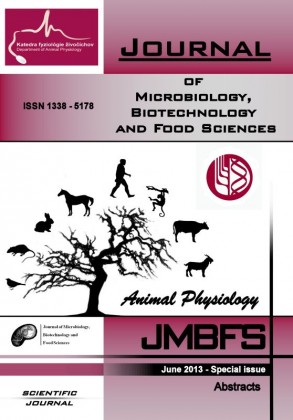NEW TRENDS IN NUTRITION PHYSIOLOGY RESEARCH
Keywords:
physiology of nutrition, enzymes, vitamins, homocysteine, civilization diseasesAbstract
Within solutions of new problems in nutrition physiology, mainly research of metabolic processes of cells and tissues, their regulation mechanisms, the study of the actions of some enzymes, unsaturated n-3 and n-6 fatty acids, or specific hormones, essential substrates, which are precursors of other biologically active substances are dominating.Interest in knowledge of the importance of minerals and trace elements as active ions across cell membranes and tissue mediators is also increasing. Recent findings in physiology of vitamins are concentrated mainly on their absorption in the digestive tract of man (the absorption of vitamin B12, folic acid, pyridoxine, and some others).
Research in molecular and physiological genetics significantly extends the knowledge in the issue of galactosaemia, phenylketonuria and disorders of homocysteine metabolism. After the finding that hyperhomocysteinemia contributes significantly not only to the occurrence of cardiovascular diseases, but also has a direct correlation with factors initiating several civilization diseases, attention has been started to pay to study of physiological factors affecting and regulating the levels of this amino acid in the human body.
Downloads
Download data is not yet available.
Downloads
Published
2013-06-06
How to Cite
KováÄik, J., Kalafová, A., Kolesárová, A., Massányi, P., LukáÄ, N., & TuÅ¡imová, E. (2013). NEW TRENDS IN NUTRITION PHYSIOLOGY RESEARCH . Journal of Microbiology, Biotechnology and Food Sciences, 2(Abstracts special issue), 21. Retrieved from https://office2.jmbfs.org/index.php/JMBFS/article/view/7552
Issue
Section
Biotechnology
License
Copyright (c) 2013 Jaroslav KováÄik, Anna Kalafová, Adriana Kolesárová, Peter Massányi, Norbert LukáÄ, Eva TuÅ¡imová

This work is licensed under a Creative Commons Attribution 4.0 International License.
All papers published in the Journal of Microbiology, Biotechnology and Food Sciences are published under a CC-BY licence (CC-BY 4.0). Published materials can be shared (copy and redistribute the material in any medium or format) and adapted (remix, transform, and build upon the material for any purpose, even commercially) with specifying the author(s).

